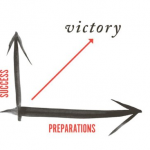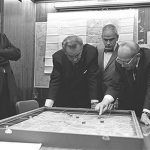The seven key concepts embedded in the above process are:
- Comprehensive planning
- Value of information
- Choice of battleground
- Speed of execution
- Adaptability
- Creation of advantage through deception
- Attack, if one must compete in the open
Comprehensive planning
To reach any goal that necessitates a multi-step process, planning must be done.
The focus is not whether to plan or not to plan.
Rather, the focus is how detailed the planning is.
Also, it is recognized that comprehensive planning is as much an art as a science.
Thoroughness of planning would encompass considerations on a macro and micro level, the inclusion of both controllable and uncontrollable factors, internal and external dimensions, human and non-human components, static and dynamic forces and tangible and intangible matters.
A comprehensive plan has to be exhaustive in coverage and considerations.
However, while plans should be detailed, the planning process should not be an excuse for not taking action.
In life there is usually never a “right time” or “perfect time” to do something. If you wait for the “right time,” then you will wait forever.
Sometimes you need to take action before the plan is “perfect” in order to build momentum.
Remember that planning should be done as preparation for implementation.
Planning is not just done for planning sake.
Value of Information
Comprehensive plans cannot be made on the basis of intuition, gut feeling or calculated guesses.
It must be based on intelligence—based on direct knowledge.
This intelligence cannot be obtained from spirits or gods; nor by inductive thinking or deductive calculations.
The best quality information is obtained by men who have direct knowledge of the enemy’s situation.
In addition, it’s best to get as close to the source as possible when gathering information.
There is a need to actively collect, store, analyze and utilize information, as well as protect your own information.
Choice of battleground
In military combat, one of the important factors is the choice of battleground.
This same logic applies to business and individual competition.
In choosing an area of competition, you should choose an area where you have some sort of distinct advantage.
Choosing the right battleground will allow you to draw on your strengths and camouflage your weaknesses.
Speed of execution
Once a comprehensive plan is created based on information gathered from intelligence and the battleground has been chosen, it is important to swiftly execute the plan.
Speed of implementation includes aspects of timing, momentum and pacing.
Adaptability
This speed in execution however does not mean just charging blindly forward.
You must collect feedback and change according to dynamic circumstances.
In addition to being flexible and responsive, you must also be innovative and creative.
You first have to get to “different” before you can get to “better”.
At any given moment, the best course of action might be a course yet to be conceived.
Plans should be adhered to as closely as possible but you must also use your judgment and deviate when the situation dictates.
Creation of strategic advantage through deception
In war, the creation of strategic advantage is very important.
Aside from exploiting advantages in weather and terrain, another important means is deception.
The morality behind the use of deception is not really questioned in war, but the use of deliberately deceptive tactics by an individual might bring up some ethical conflicts.
Certain individuals might not feel comfortable using deception themselves, but you cannot deny that other people are using deception.
If nothing else, you should be aware of deception so you can guard against it.
Attack, if one must compete in the open
When in a direct confrontation, the most viable way to win is to go on the offensive.
Defense can only result in a “non-lose” situation.
It can prevent failure but cannot guarantee success.
As it says in Sima Fa, “With armor one is secure; with weapons one attains victory.”
Awesomeness lies in not making changes.
Benefice lies in according with the seasons.
Perceptivity lies in promptly responding to affairs.
Success in warfare lies in controlling spirit.
Skill in attacks lies in fathoming externals.
Defense lies in manipulating external appearance.
Not being excessive lies in measuring and counting.
Not encountering difficulty lies in foresight and preparation.
Being cautious lies in respecting the small.
Wisdom lies in controlling the large.
Eliminating harm lies in being decisive.
If you accept that there is an entanglement of explicit and implicit competition in life, then you can draw from the process and principles above to excel in whatever competitive situation you encounter.
Perfect practice makes perfect.
And in the words of Kenny Rogers, “If you’re going to play the game, boy. You got to learn to play it right.”


